Sustainable Development
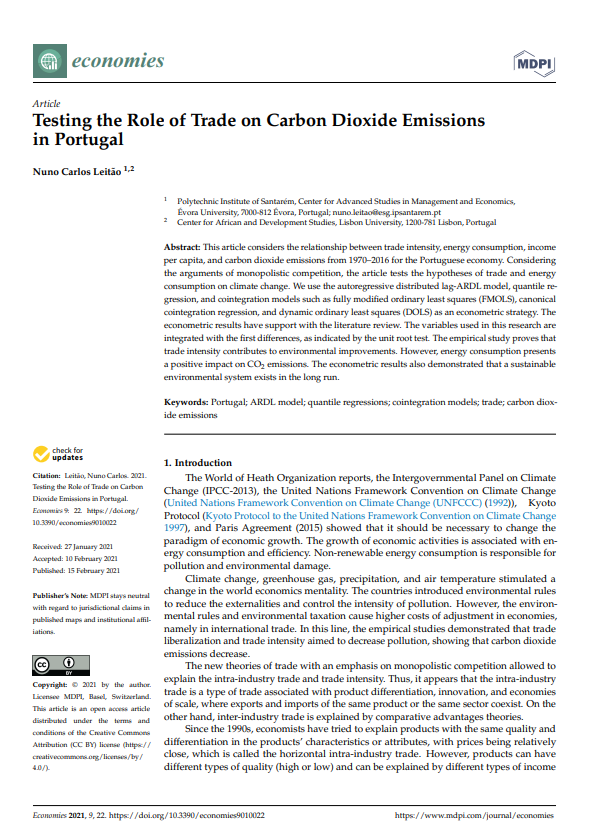
Testing the Role of Trade on Carbon Dioxide Emissions in Portugal
Abstract:
Testing the Role of Trade on Carbon Dioxide Emissions in Portugal considers the relationship between trade intensity, energy consumption, income per capita, and carbon dioxide emissions from 1970–2016 for the Portuguese economy. Considering the arguments of monopolistic competition, the article tests the hypotheses of trade and energy consumption on climate change. We use the autoregressive distributed lag-ARDL model, quantile regression, and cointegration models such as fully modified ordinary least squares (FMOLS), canonical cointegration regression, and dynamic ordinary least squares (DOLS) as an econometric strategy. The econometric results have support with the literature review. The variables used in this research are integrated with the first differences, as indicated by the unit root test. The empirical study proves that trade intensity contributes to environmental improvements. However, energy consumption presents a positive impact on CO2 emissions. The econometric results also demonstrated that a sustainable environmental system exists in the long run. This paper evaluates the theoretical and empirical studies on the effects of trade on carbon dioxide emissions. The theoretical arguments of monopolistic competition models and the relationship between trade intensity and pollution emissions are evaluated, allowing justifying this empirical study’s results. The econometric results show that trade intensity contributes to improving the environment, both in the short and long term, justifying the importance of environmental regulation.
Quotation:
Leitão, N.C. (2021a). Testing the Role of Trade on Carbon Dioxide Emissions in Portugal. Economies (MDPI) 2021,9 (1), 22. https://doi.org/10.3390/economies9010022
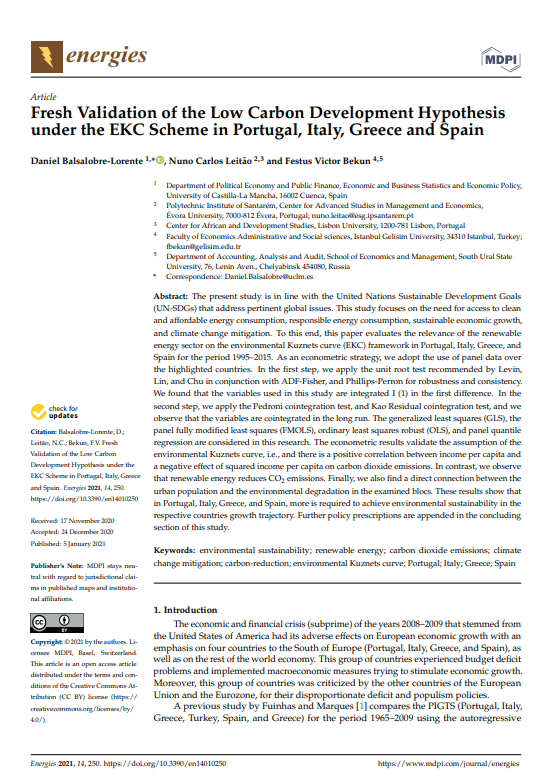
Fresh Validation of the Low Carbon Development Hypothesis under the EKC Scheme in Portugal, Italy, Greece and Spain
Abstract:
Fresh Validation of the Low Carbon Development Hypothesis under the EKC Scheme in Portugal, Italy, Greece and Spain is in line with the United Nations Sustainable Development Goals (UN-SDGs) that address pertinent global issues. This study focuses on the need for access to clean and affordable energy consumption, responsible energy consumption, sustainable economic growth, and climate change mitigation. To this end, this paper evaluates the relevance of the renewable energy sector on the environmental Kuznets curve (EKC) framework in Portugal, Italy, Greece, and Spain for the period 1995–2015. As an econometric strategy, we adopt the use of panel data over the highlighted countries. In the first step, we apply the unit root test recommended by Levin, Lin, and Chu in conjunction with ADF-Fisher, and Phillips-Perron for robustness and consistency. We found that the variables used in this study are integrated I (1) in the first difference. In the second step, we apply the Pedroni cointegration test, and Kao Residual cointegration test, and we observe that the variables are cointegrated in the long run. The generalized least squares (GLS), the panel fully modified least squares (FMOLS), ordinary least squares robust (OLS), and panel quantile regression are considered in this research. The econometric results validate the assumption of the environmental Kuznets curve, i.e., and there is a positive correlation between income per capita and a negative effect of squared income per capita on carbon dioxide emissions. In contrast, we observe that renewable energy reduces CO2 emissions. Finally, we also find a direct connection between the urban population and the environmental degradation in the examined blocs. These results show that in Portugal, Italy, Greece, and Spain, more is required to achieve environmental sustainability in the respective countries growth trajectory. Further policy prescriptions are appended in the concluding section of this study.
Quotation:
Balsalobre-Lorente, D., Leitão, N.C., Bekun, F., V. (2021). Fresh Validation of the Low Carbon Development Hypothesis under EKC Scheme in Portugal, Italy, Greece, and Spain. Energies 2021. 14(1), 250. https://doi.org/10.3390/en14010250
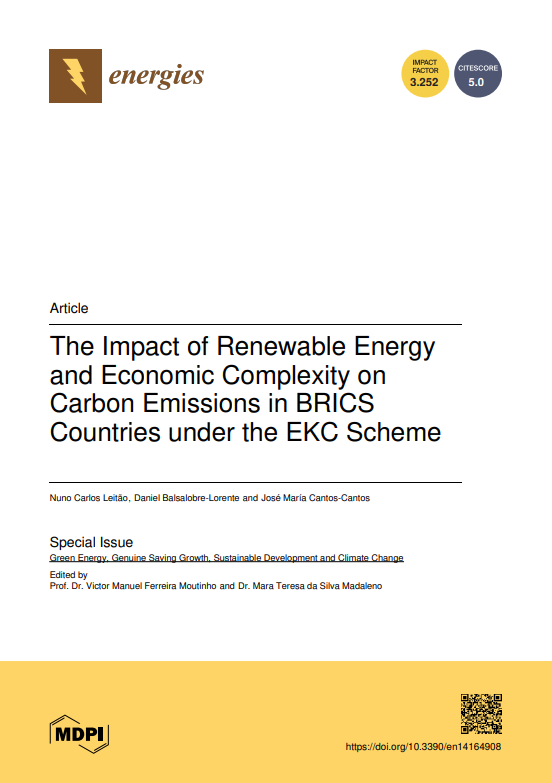
The Impact of Renewable Energy and Economic Complexity on Carbon Emissions in BRICS Countries under the EKC Scheme
Abstract:
Economic complexity makes it possible to assess the development of the countries, the relations of innovation, and the differentiation of products. The Impact of Renewable Energy and Economic Complexity on Carbon Emissions in BRICS Countries under the EKC Scheme considers the links between the hypotheses of the Kuznets environmental curve and economic complexity using panel data for the group of BRICS countries (Brazil, Russia, India, China, and South Africa) from 1990 to 2015. As an econometric strategy, this study considered the panel fully modified least squares (FMOLS), panel dynamic least squares (DOLS), fixed effects (FE), and Panel Quantile Regression. The empirical results showed that economic complexity, income per capita, renewable energy, and carbon dioxide emissions are integrated with the first difference when applying the unit root test. The arguments of Pedroni and Kao cointegration tests were also used. According to these results, the variables used in this research are cointegrated in the long run. The results validated the arguments of the EKC hypothesis, i.e., the income per capita and squared income per capita are positively and negatively correlated with CO2 emissions. Moreover, economic complexity and renewable energy aim to improve environmental damage and climate change.
Quotation:
Leitão, N.C., Balsalobre-Lorente, D., Cantos-Cantos, J.M. The Impact of Renewable Energy and Economic Complexity on Carbon Emissions in BRICS Countries under the EKC Scheme. Energies 2021, 14, 4908. https://doi.org/10.3390/en14164908
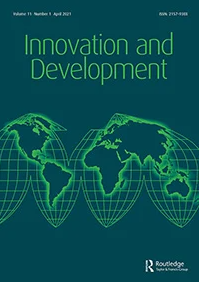
Innovation in development cooperation: emerging trajectories and implications for inclusive sustainable development in the 21st century
Abstract:
In the past twenty years, innovation has slowly, but steadily, become an important presence in development cooperation discourse and practice. The ambitious UN 2030 Sustainable Development Agenda has accelerated this trend, providing a strong framework for the main argument in favour of an innovation agenda for international development: without new ideas and innovative solutions, solving the current global development challenges will not be possible. Although this innovation-push is in line with a wider predominant view of innovation as an inherently positive force of progress, that alone does not explain when, how, and why innovation becomes a key topic in the field. This article seeks to fill this gap in the literature, providing an initial overview of innovation in development cooperation in the post-2000s. It argues, firstly, that innovation has always been part of international development policy and practice. Secondly, it links the recent strengthening of the innovation discourse to three trends in the systemic transformation of the field: the triumph of metrics-based agendas, the ICTs and digitalization revolutions, and the role of private sector actors. It concludes by critically assessing the implications of this narrative in changing the politics of innovation towards more inclusive sustainable development policies and practices.
Quotation:
Ana Luísa Silva (2021) Innovation in development cooperation: emerging trajectories and implications for inclusive sustainable development in the 21st century, Innovation and Development, 11:1, 151-171, DOI: 10.1080/2157930X.2020.1807100
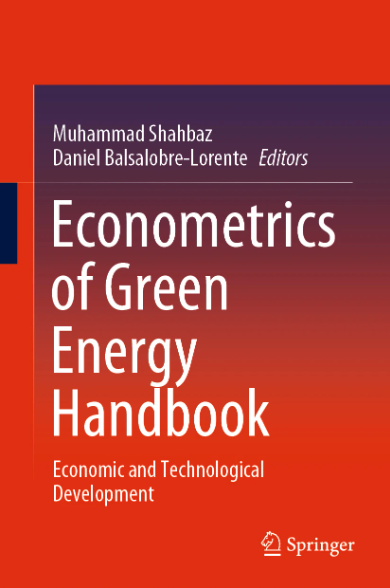
The Causality between Energy Consumption, Urban Population, Carbon Dioxide Emissions and Economic Growth.
Abstract:
This article assesses the relationship between electricity consumption and urbanisation by comparing the econometric results of distributed autoregressive lag (ARDL) and vector autoregressive lag (VAR) for the period 1960-2015. Granger causality is also applied to the Portuguese economy. In this study, we use some hypotheses that describe the link between electricity consumption, urban population, carbon dioxide emissions, and economic growth. The motivation of this research focuses on the relationship between electricity consumption (energy consumption) and urban population, supported by the theoretical and empirical contributions of energy and urban economics. The empirical results show that electricity consumption exhibits causality with economic growth, urban population, carbon dioxide emissions, and international trade. This research also proves that there is cointegration among all variables in the long run. Authored by Nuno Carlos Leitão e Daniel Balslobre-Lorente, this chapter (nº5) is part of the book “Econometrics of Green Energy Handbook”, which shares essential insights into the dynamic between energy innovations, environmental guidelines, and economic development, demonstrates how globalization has led to the development of greener energy technologies, paints a global picture using case studies on energy innovation in numerous countries and discusses both technological and policy aspects of green energy development.
Quotation:
Leitão, N.C. & Lorente, D. B. (2020): The Causality between Energy Consumption, Urban Population, Carbon Dioxide Emissions and Economic Growth. Springer Handbook Green Energy Series: Econometry of Green Energy- Economy and Technological and Development. Publisher: Springer.

Inovação para os objectivos de desenvolvimento sustentável
Inovação para os objectivos de desenvolvimento sustentável by Luís Pais Bernardo is a guide to perplexity. Innovation for Development is the subject of reports, studies and international conferences. Laboratories, centres and initiatives multiply. Innovation models, innovation at scale and the impacts of innovation are discussed. But the fundamental questions remain. What is Innovation (for Development)? What is it for? How is it done? And is it worth doing? These are the questions that the entire international development community has been asking, without pause, for a decade. This report is a guide that does not aim to discover the origin of the practices and discourses of Innovation for Development. Nor do we intend to draw up a compendium of innovations. Our ambition is somewhat more pragmatic: to provide concrete answers to immediate questions and to help build a stronger debate on development, development cooperation and innovation in development cooperation. Where necessary, we explore important questions that are reflected in innovation practice: for example, Innovation for Development is an answer to the problem of ODA effectiveness and a priority of the 2030 agenda. Why does this matter? Because it has implications for the financing, practice, impact, scale and evaluation of development cooperation.
Abstract:
What is Innovation for Development? What is it for? How is it done? And how does it differ from innovation in other sectors? This report is an answer to those questions. Between 2015 and 2030, the Sustainable Development Goals are the great global challenge. Innovation for Development emerged in response to a complex debate on aid effectiveness. Today, the questions are different: how can we innovate to achieve the SDGs? In this report, we focus on clarifying basic terms: innovation, scale and impact. We discussed the need to structure Innovation for Development around five components: learning, creating, organizing, leading and collaborating.
Quotation:
Bernardo, Luís Pais (2020). Inovação para os objectivos de desenvolvimento sustentável. Lisboa: CEsA – Centro de Estudos sobre África e Desenvolvimento/ISEG. URL: https://www.repository.utl.pt/handle/10400.5/20052
Access the article here.

Sector privado, inovação e ODS
In Sector privado, inovação e ODS, Luís Pais Bernardo explores the reasons why companies can and should adopt business models aligned with the SDGs, in partnership with international cooperation actors. Partnerships are key to this transformation; today, business economic activity tends to move along global value chains in which the intervention of international cooperation for development, around the 2030 Agenda, will have an increased impact. In this context, the inclusive and responsible management of the procurement of services and products on a global scale by companies becomes increasingly important. Partnerships, global value chains and procurement of goods and services are the three areas explored in this report.
Abstract:
The central role of the private sector in international development cooperation is one of the innovations of the 2030 Agenda. In 2014, UNCTAD estimated the annual funding gap for the Sustainable Development Goals (SDGs) at US$2.5 billion. Following the Busan summit and the conclusions of the Millennium Development Goals (MDGs), the capabilities, resources and skills of the private sector are no longer viewed with suspicion, but are seen as central to achieving the 17 SDGs. Innovation, as a pillar of the private sector in the 20th century XXI, is the new paradigm. In this report, we explore the reasons why companies can and should adopt business models aligned with the SDGs, in partnership with international cooperation actors. Partnerships are key to this transformation; today, business economic activity tends to move along global value chains in which the intervention of international cooperation for development, around the 2030 Agenda, will have an increased impact. In this context, the inclusive and responsible management of the acquisition of services and products on a global scale by companies, assumes an increasing importance. Partnerships, global value chains and procurement of goods and services are the three areas explored in this report.
Quotation:
Bernardo, Luís Pais (2020). Sector privado, inovação e ODS. Lisboa: CEsA – Centro de Estudos sobre África e Desenvolvimento/ISEG. URL: https://www.repository.utl.pt/handle/10400.5/20053
Access the article here.





